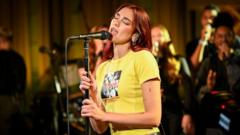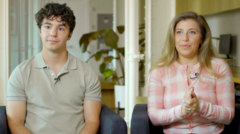Over 400 British musicians, writers, and artists together with renowned figures are pressuring lawmakers to amend copyright regulations amid fears of AI misappropriating their creative outputs.
Elton John and Dua Lipa Demand AI Protection: A Call for Copyright Reform

Elton John and Dua Lipa Demand AI Protection: A Call for Copyright Reform
Celebrated artists unite in a letter urging the British Prime Minister to enhance copyright laws against AI exploitation.
In a notable collaboration, renowned artists including Sir Elton John, Dua Lipa, and Ian McKellen have rallied together to advocate for updated copyright laws addressing the challenges posed by artificial intelligence. In an open letter to the leader of the UK Labour Party, Sir Keir Starmer, more than 400 creators express their concerns around the implications of current legislation, which they claim may allow tech companies to appropriate their works without proper accountability.
The artists warn that inadequate protection would risk not only their livelihoods but also jeopardize the UK's reputation as a leading creative hub. They are urging the Prime Minister to support an amendment to the Data (Use and Access) Bill, spearheaded by Baroness Beeban Kidron, obligating AI developers to maintain transparency with copyright owners regarding the utilization of their work for training AI models.
A government spokesperson has suggested that they aim to foster a balance between the flourishing of creative industries and AI firms. In response to the artists' appeals, they stressed that no modifications would be pursued without meticulous consideration of their impact on creators.
The strong artist coalition includes esteemed authors like Kazuo Ishiguro, singer-songwriters such as Kate Bush and Robbie Williams, and various prominent figures from the arts sector. Echoing these sentiments, Sir Paul McCartney had previously raised similar concerns about AI's potential to undermine artistic integrity.
The call for reform comes amid increased scrutiny over the use of copyrighted material in generative AI systems, which create new content from simple prompts, often raising ethical questions regarding data usage and energy consumption. While artists previously voiced their frustrations through actions such as an album release in protest against proposed copyright law amendments, the UK government is now reevaluating its stance in the wake of widespread discontent.
Julia Willemyns, a think tank co-founder, offered a counterpoint, warning that such reforms could stifle innovation and economic growth within the UK, asserting that a restrictive copyright system might compel AI development overseas.
Author Kazuo Ishiguro, reflecting on the call for equitable copyright frameworks, emphasized the importance of addressing these issues judiciously. With the legislative landscape evolving, it's critical for the government to consult adequately with artists and ensure any new measures that might affect creative copyright laws are beneficial and fair.
As the UK grapples with the burgeoning influence of AI, Baroness Kidron advocates for her amendment, asserting that transparency could pave the way for beneficial licensing agreements between creators and tech companies, potentially establishing the UK's standing in the global AI marketplace.
The government remains dedicated to thoroughly examining this issue, promising to compile a comprehensive report to understand the economic implications surrounding the potential amendments. As debates around AI use and copyright continue, artists are standing firm to protect their creative identities amid the rapidly changing technological landscape.






















